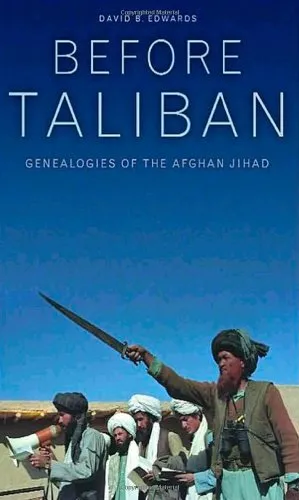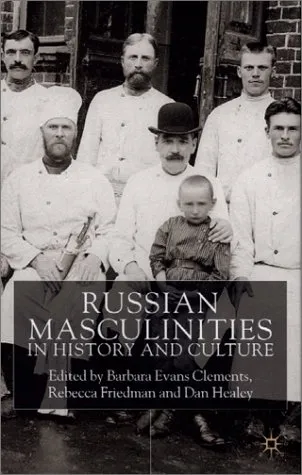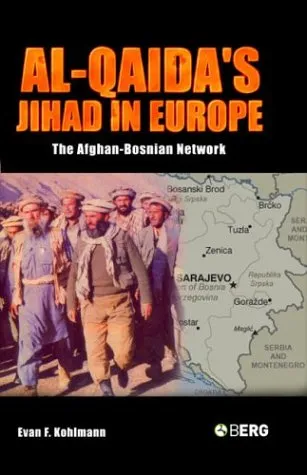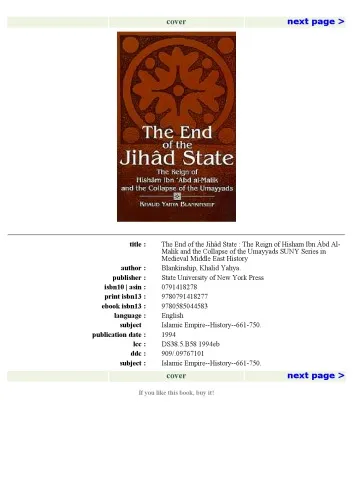Before Taliban: Genealogies of the Afghan Jihad
4.5
بر اساس نظر کاربران

شما میتونید سوالاتتون در باره کتاب رو از هوش مصنوعیش بعد از ورود بپرسید
هر دانلود یا پرسش از هوش مصنوعی 2 امتیاز لازم دارد، برای بدست آوردن امتیاز رایگان، به صفحه ی راهنمای امتیازات سر بزنید و یک سری کار ارزشمند انجام بدینکتاب های مرتبط:
معرفی کتاب "Before Taliban: Genealogies of the Afghan Jihad"
کتاب Before Taliban: Genealogies of the Afghan Jihad نوشته دیوید بی. ادواردز، اثری جامع و پژوهشی است که ریشهها و پیشزمینههای تاریخی و فرهنگی جنبش جهادی در افغانستان را بررسی میکند. این کتاب تلاش دارد با نگاهی تاریخی و انسانشناختی، به فهم عمیقتری از تحولاتی که منجر به ظهور طالبان و شکلگیری شرایط فعلی افغانستان شدند، برسد. نویسنده با تحلیل داستانهای فردی، اجتماعی و تاریخی، تصویری چندلایه از تحولات افغانستان ارائه میدهد که برای پژوهشگران، دانشجویان و علاقهمندان به مطالعه درباره خاورمیانه و آسیای مرکزی از اهمیت بسزایی برخوردار است.
خلاصه کتاب
در این کتاب، دیوید ادواردز به بررسی این موضوع میپردازد که چگونه جامعه افغانستان، از نظر اجتماعی، سیاسی و فرهنگی، به حالتی رسید که افراطگرایی مذهبی و جهاد به بخش جداییناپذیر از روایات ملی تبدیل شد. او با بهرهگیری از روشهای انسانشناسی و گزارشهای میدانی، داستان زندگی افرادی که در جهاد علیه شوروی نقش داشتند را بررسی میکند. ادواردز بر ایدهها و باورهایی تمرکز میکند که به تدریج جای مفهوم سنتی "جنگ مقدس" را گرفتهاند و توضیح میدهد چگونه این مفاهیم جدید، تغییرات بنیادینی در جامعه افغانستان به وجود آوردند.
نویسنده به طور ویژه به شرایط سیاسی پیش از انقلاب ۱۹۷۸، ساخت قدرت قبایل، و درهمتنیدگی عوامل دینی، اجتماعی و قبیلهای توجه دارد. او معتقد است که برای درک طالبان و جنبشهای جهادی مشابه، باید به گذشته تاریخی و فرآیندهای اجتماعی پیش از آنها نگاه کرد. کتاب به سه محور اصلی تمرکز دارد: هویت قبیلهای، ایدئولوژی مذهبی، و تأثیر جنگ سرد بر سیاستهای منطقهای.
نکات کلیدی کتاب
- تحلیل جامع از ریشههای ایدئولوژیک و تاریخی جهاد در افغانستان.
- توضیح رابطه میان سیاستهای منطقهای و ظهور طالبان.
- استفاده از داستانهای واقعی برای ارائه تصویری انسانی و شخصی از تاریخ.
- رویکرد میانرشتهای که تاریخ، انسانشناسی و علوم سیاسی را تلفیق میکند.
- ارائه تصویری دقیق از تأثیر جنگ سرد و دخالت نیروهای خارجی بر جامعه افغانستان.
جملات معروف از کتاب
"Understanding Afghanistan’s past is crucial to grasping the nature of its present struggles."
"War and religion have combined in Afghanistan to create a unique cultural dynamic, one that transcends simple binaries of good and evil."
چرا این کتاب اهمیت دارد؟
کتاب Before Taliban به دلیل چشمانداز جامع، روششناسی دقیق و تحلیلهای چندجانبهاش از اهمیت زیادی برخوردار است. این اثر نه تنها یک منبع علمی باارزش است، بلکه به تصمیمسازان، فعالان و مخاطبان عمومی کمک میکند تا آسیبشناسی دقیقتری از شرایط افغانستان داشته باشند. دیوید ادواردز با بهرهگیری از مهارت انسانشناسی و مشاهدات میدانی، ساختاری از تاریخ افغانستان ارائه میکند که به وضوح چرایی ظهور و دوام طالبان را توضیح میدهد. این کتاب به طور ویژه برای کسانی که در زمینه سیاست، تاریخ و فرهنگ خاورمیانه و آسیای مرکزی پژوهش میکنند، یک منبع ضروری محسوب میشود.
ادواردز با تمرکز بر پیشینههای سیاسی و اجتماعی، نشان میدهد که ظهور طالبان و شاخههای افراطگرایی، نه یک رخداد تصادفی بلکه نتیجهای از دههها تغییرات اجتماعی، استعمار و جنگ است. این کتاب، پلی میان گذشته و حال ایجاد کرده و مسیر فهم آینده افغانستان را ترسیم میکند.
Introduction to "Before Taliban: Genealogies of the Afghan Jihad"
Written by David B. Edwards, Before Taliban: Genealogies of the Afghan Jihad is an insightful and profound exploration of the historical, cultural, and social forces that shaped modern Afghanistan and eventually led to the rise of the Taliban. This book provides a comprehensive and nuanced understanding of how long-standing tribal customs, political upheavals, and external interventions have defined the trajectory of Afghan society and politics. Edwards combines rigorous academic research with in-depth fieldwork to weave a compelling narrative that illuminates the prelude to the contemporary conflicts in Afghanistan.
Edwards traces the genealogies of Afghan jihad by delving into the lives and stories of key historical figures, analyzing the interplay between ideology, tribal loyalties, and the tumultuous events that saw the transformation of Afghanistan into a hotbed of radicalism. Through its focus on anthropology and history, the book captures the complex and multidimensional nature of Afghan society, tracing the roots of the ideological and social tensions that culminated in the Taliban's rise to power.
This book is essential reading for anyone interested in understanding the historical precursors of the Taliban movement and the broader dynamics of conflict in Afghanistan. More than simply a study of political Islam, Before Taliban is a humanistic investigation into the lives of individuals and the cultural fabric of a society irreversibly impacted by decades of war and external intervention.
Detailed Summary of the Book
Before Taliban spans decades of Afghan history, focusing particularly on the sociopolitical conditions leading to the Soviet invasion in 1979, the Afghan resistance during the 1980s, and the eventual eruption of radicalism in the 1990s. Edwards explores three central figures in Afghanistan's political evolution—Sabghatullah Mojaddidi, Bacha Khan, and Najibullah—through their personal stories and political roles. These figures serve as the focal points for examining the intersecting forces of religion, tribalism, and modernity in shaping Afghan society.
Edwards paints a portrait of Afghan society torn between traditional tribal structures and the modernizing (often externally imposed) forces of the state. The book delves deep into the relationships between regional and global powers, illustrating how the Cold War politics of the United States and the Soviet Union exacerbated local divisions. Edwards also documents how tribal loyalties and Islamic ideologies were mobilized, manipulated, and repurposed during the jihad against Soviet forces, eventually becoming the ideological foundation for the Taliban’s extremist policies.
One of the book's defining strengths is its focus on human narratives. By bringing the experiences of individual Afghans to the forefront, Edwards provides a poignant account of how ordinary people navigated extraordinary turmoil and dislocation. It is a scholarly yet accessible analysis of Afghanistan’s jihad and its repercussions on a national and global scale.
Key Takeaways
- Afghanistan's political and social trajectory has been heavily influenced by the interplay between tribal customs, Islamic ideologies, and the agendas of external powers.
- The Soviet invasion and subsequent U.S. involvement in Afghanistan created a highly militarized society, paving the way for radicalism and extremism.
- Through the lens of anthropology, Edwards reveals how cultures are reshaped during times of prolonged conflict.
- The Taliban's ascent was not an isolated historical event but rather a culmination of decades of political, social, and ideological transformations in Afghanistan.
- The human stories underlying Afghanistan's political history are crucial to understanding the broader narrative of the Afghan conflict.
Famous Quotes from the Book
"The jihad was not simply a religious war; it was a cultural revolution, one that transfigured the landscape of Afghan society and the lives of the people within it."
"In Afghanistan, history is not an unbroken chain of cause and effect, but rather a kaleidoscope of overlapping images and events."
"To understand the Taliban is to understand the genealogy of Afghan jihad, a process forged not only in blood but in the imagination of a nation in perpetual conflict."
Why This Book Matters
Before Taliban is more than just a historical account—it is a lens through which readers can gain critical insights into the enduring complexities of Afghanistan’s culture, history, and politics. By grounding his analysis in both anthropological and historical methods, Edwards demonstrates the importance of understanding the cultural underpinnings of political events, rather than relying on reductive or surface-level interpretations.
As Afghanistan continues to grapple with conflict and instability, this book remains highly relevant. It is indispensable for students, scholars, policymakers, and general readers seeking to understand the origins of modern Afghan political dynamics, the lasting effects of the Cold War, and the precursors to global issues such as terrorism and extremism. By revealing the lived experiences and cultural context of Afghans during tumultuous periods, Edwards challenges us to rethink simplistic narratives about Afghanistan and the rise of the Taliban.
دانلود رایگان مستقیم
شما میتونید سوالاتتون در باره کتاب رو از هوش مصنوعیش بعد از ورود بپرسید
دسترسی به کتابها از طریق پلتفرمهای قانونی و کتابخانههای عمومی نه تنها از حقوق نویسندگان و ناشران حمایت میکند، بلکه به پایداری فرهنگ کتابخوانی نیز کمک میرساند. پیش از دانلود، لحظهای به بررسی این گزینهها فکر کنید.
این کتاب رو در پلتفرم های دیگه ببینید
WorldCat به شما کمک میکنه تا کتاب ها رو در کتابخانه های سراسر دنیا پیدا کنید
امتیازها، نظرات تخصصی و صحبت ها درباره کتاب را در Goodreads ببینید
کتابهای کمیاب یا دست دوم را در AbeBooks پیدا کنید و بخرید
1369
بازدید4.5
امتیاز0
نظر98%
رضایتنظرات:
4.5
بر اساس 0 نظر کاربران
Questions & Answers
Ask questions about this book or help others by answering
No questions yet. Be the first to ask!















